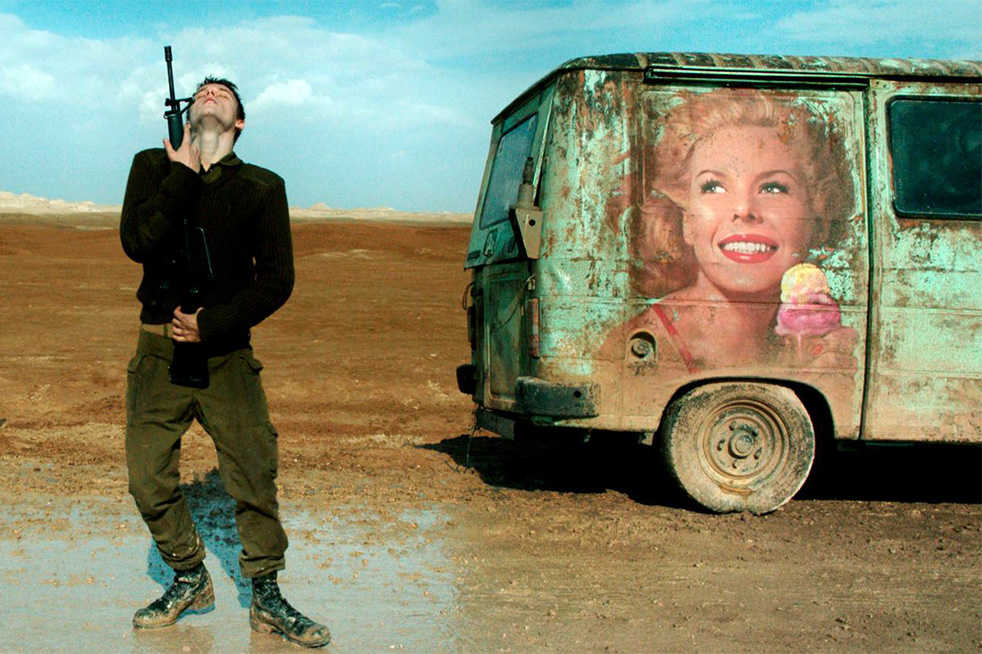“Foxtrot” primarily splits attention between two settings: the immaculate loft of successful Israeli architect Michael Feldman and a decrepit outpost that guards a solitary road tracing a path through miles of endless desert. Both are in Israel. Together they capture a fundamental conflict that director Samuel Maoz seeks to shine a heart-wrenching light upon through his newest film, “Foxtrot.”
Maoz, who previously directed “Lebanon,” which follows four Israeli tank operators on the first day of the 1982 Lebanon War, served in the Israeli Defense Force as all Israeli adult citizens must. He draws upon his experiences before and after his service to inform his films.
His newest feature follows Michael Feldman (Lior Ashkenazi, “Norman: The Moderate Rise and Tragic Fall of a New York Fixer”) and his wife, Dafna (Sarah Adler, “Our Music”) after learning that their son, Jonathan, had been killed in action.
When a party of soldiers enters the Feldmans’ loft to inform them of the news, it feels like an invasion. Dafna faints against a vertigo-inducing painting on the wall behind her, and Michael is forced to quietly swallow his grief as the soldiers bombard him with impersonal, rehearsed details about the funeral that will occur the following day.
Amidst the barrage, Maoz captures Michael with dizzying crane shots, emphasizing his frailty and disorientation as he stumbles over the patterned tiles beneath his feet. A man of success and stature, Michael, who himself was a tank commander during his service, struggles to maintain composure — to reconcile the surety and apparent safety of his civilian life with the war that has taken his son.
During the second act, Maoz jumps to a desert outpost where four young soldiers, living in a cargo crate sinking into the mud beneath it, man a roadblock on the edge of civilization.
A single road stretches through the endless desert, pushing against a painted sky, and on the road rests a single, creaking gate that these four boys watch over. Their daily routine is as plain as the desert before them, and Maoz treats viewers to the bittersweet banter the four soldiers strike up to cut through the mundanity.
One dances, another fantasizes about Pamela Anderson and another draws scantily clad women. When night falls, a lone car will tumble past, fading into existence from the dark expanse surrounding the outpost.
The car will stop, and the soldiers will shine a brilliant spotlight upon the travelers, illuminating visitors from a civilization far removed from this outpost. With agonizing sluggishness, the soldiers will claim the visitors’ passports and vet the travelers using an ancient, dusty computer. In the interim, the visitors wait in limbo before being returned their passports and driving away, fading back into the endless night.
Here, at the edge of Israel, Maoz makes clear the conflict in Israel’s soul between an inherited war whose scars have been imprinted on every citizen during their mandatory service, and the pretense of civility and normalcy that civilian life in Israel assumes simultaneously.
Maoz weaves a powerful narrative on grief, guilt and the randomness of fate through his truly impressive visuals. Subtly underscoring the conflicting emotions of the Feldmans and the soldiers on the ground, Maoz leans into formally surreal techniques, making the shadows on the screen impenetrable and the lights blinding.
Sensation is heightened as characters seem to glide around each other. The paintings adorning Michael Feldman’s apartment seem to perfectly mirror characters’ internal struggles. Flares cut through the desert’s darkness and flicker in a beautiful yet tenuous display. The desert stretches into the sky in a blend of mesmerizing acrylic.
Maoz’s framing is truly admirable, and he is able to offer viewers a vision of war and grief that is not overwhelmed by somber tones. Beauty exists. Laughter exists. Against the sadness and the mundane routines, life in Maoz’s world is multidimensional.
Near the film’s end, still in mourning, Michael and his wife smoke a joint and break into messy, cascading bouts of laughter at the ridiculously impersonal invitation they received to a memorial for fallen soldiers. The poignant scene is enlivened by the strength of Ashkenazi and Adler’s performances.
So much of the camera’s attention is trained squarely on Lior Ashkenazi’s face as his Michael Feldman struggles to cope with his son’s death. Stone-faced but imbued with a guilt and sadness broiling within him, Ashkenazi perfectly embodies the layers of internal conflict festering in Feldman since his time in the IDF.
After burying the guilt he feels from the actions he committed as a soldier, Feldman’s civilian facade of success as an architect and composure as a father slowly crumbles before his family as his son is snatched from him.
Whether it is some divine punishment or some random act of fate, Maoz never says. The sense of control Feldman once believed he had slowly spirals away, and Ashkenazi intimately captures every step in Feldman’s descent.
With the exception of a brief semi-animated segment whose tone is mildly out of sync with the rest of Maoz’s narrative, Maoz presents a confidently and compassionately composed film that forces his countrymen to question the place of war in their society.
For younger American viewers Maoz targets that may not be quite familiar with the Israeli affairs and who have never lived through a period of conscription, “Foxtrot” still offers a beautifully shot and universal account of grief and guilt that will surely leave an impression.
“Foxtrot” will be playing at the Landmark Midtown Art Cinema through April 5.
